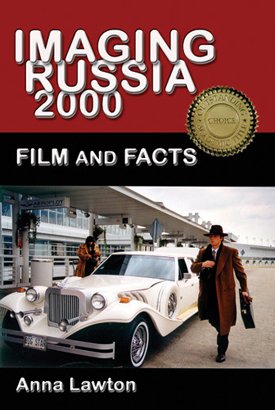
About the Author
Anna Lawton is a specialist in Russian film history. Professor Lawton teaches courses in visual culture and film studies at Georgetown University. She served on the National Gallery of Art Film Advisory Board, and has written extensively in scholarly journals and periodicals. Her books on cinema include The Red Screen: Politics, Society, Art in Soviet Cinema, and Before the Fall: Soviet Cinema in the Gorbachev Years.
IMAGING RUSSIA 2000: Film and Facts
Anna LawtonNew Academia Publishing, 2004
343 Pages, 41 Illustrations
ISBN 978-0-9744934-3-5 Paperback
ISBN 978-0-9744934-2-8 Hardcover
ISBN 978-1-1228485-0-3 e-Book
$29.00 Hardcover
$9.99 e-Book
For BULK ORDERS, order directly from New Academia Publishing.
Order ebook from (Amazon Kindle) www.amazon.com; (Kobo) www.kobobooks.com; (Kobo Coupons) http://www.therawfeed.com; (Barnes&Noble Nook) www.bn.com; (Sony ReaderStore) http://ebookstore.sony.com; (Google Ebook Store) http://ebooks.google.com; (Ingram Digital) www.diesel-ebooks.com; iBookstore (iPad/iPhone); any ebook retailer.
Queries: orders@newacademia.com
Awards:

About the Author
Anna Lawton is a specialist in Russian film history. Professor Lawton teaches courses in visual culture and film studies at Georgetown University. She served on the National Gallery of Art Film Advisory Board, and has written extensively in scholarly journals and periodicals. Her books on cinema include The Red Screen: Politics, Society, Art in Soviet Cinema, and Before the Fall: Soviet Cinema in the Gorbachev Years.
About the book
This book incorporates into an organic whole the realities of the 1990s in Russia, focusing on film production, the films themselves, and the socio-political-cultural context. The result is an unfolding story, in which film and facts occupy the same space. Like the “man with the movie camera,” the author roams through the narrative, opening fresh fields of vision, and building unexpected montage sequences. She invites the readers to follow her and engage in a challenging interactive game.
Praise
“Lawton’s excellent book is both a path-breaking survey of Russian cinema since the fall of the Soviet Union and a lively firsthand account of the faltering first steps of the newly democratic capitalist state. Summing Up: Essential. All collections, all levels.”
-Stuart Liebman, CUNY (CHOICE, September 2005)
“This melange of emotional diary entries, rough sketches, exhilarating first-person reportage on two coups d’état, abundant flashbacks spotlighting the country’s history, digests of the cinema press, and more, turns out to be a fine way of uncovering the identity of post-Soviet Russia.”
-Andrei Khrenov, CINEASTE (Spring 2006)
“Anna Lawton’s sparkling and original work combines impeccable scholarship, informed analysis of large issues, and an engaging interface between the nitty-gritty of daily life in Moscow and howthat life is represented in cinema. I can think of no better guide to the heart of post-Soviet urban Russia than this entertaining and refreshing book.”
-Richard Stites, Professor of History, Georgetown University
“Anna Lawton deftly tells two stories–one about the evolution of Russian film since the collapse of the Soviet Union in 1991, and the other about Russian life during that same period. She managed to capture a vivid portrait of Moscow of the 1990s.”
-Blair Ruble, Director, The Kennan Institute
“Lawton’s latest book is subversive in both content and form… Superbly researched and vividly written… It is a ‘must read’.”
-Denise J. Youngblood, University of Vermont, Rethinking History (June 2006)
“This book is an engaging read and an informative resource.”
-Seth Graham Stanford University, The Russian Review (July 2006)
“Anna Lawton’s work on Russian cinema has always been marked by great clarity, good sense, and informative backgrounds and context. In her new book she adds imagination: on-the-ground reports from the new Russia correlated to the films emerging from, and reflecting the new society and its moods.”
-Louis Menashe, Professor of History, Polytechnic University.





 Coming Soon
Coming Soon Awards
Awards